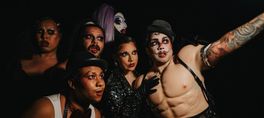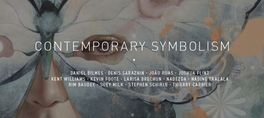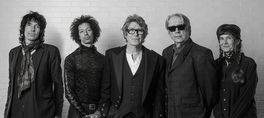Omar Souleyman - the Syrian artist who not only changed the vibe of weddings throughout the Middle East with his Shaabi street sound but also brought it to the West through his notorious late night festival slots - has finally recorded an album. After three compilations and a live release, Wenu Wenu is his first album to be recorded in a studio and was produced by Kieran Hebden (Four Tet).
Born in 1966, Souleyman grew up in Ra's al'-Ayn, a Syrian town in the northeastern region of Jazeera. That's where he first heard Syrian folk music played on a long-necked lute called a bozouki and rebab, a single-stringed fiddle. He enlisted Rizan Sa'id from a local Kurdish combo in 1996. The pair electrified Souleyman's acoustic music - playing it harder, faster, louder, and more thrilling than ever before. He became an increasingly prominent act on the local wedding circuit, eventually generating an estimated 500 bootleg recordings and plenty of wild YouTube videos.
Dabke is a foot-stomping circle dance popular throughout the Middle East; in Syria, men and women perform it together. The one-time mason has been updating his native land's traditional dabke dance music since 1996.
Speaking in Arabic through a translator from his - let's hope - temporary home in nearby Turkey, Souleyman describes Wenu Wenu as being "nearly live." Clearly delighted by the results, Souleyman tips his keffiyeh to Hebden for capturing the singer and his longtime musical partner, the keyboardist-composer Rizan Sa'id, at their purest, with very little overdubbing.
Although he's received many impressive recent offers, Souleyman says wedding gigs are a thing of the past for him, due in part to the situation in Syria, and that he now prefers to perform in concert. His international audience is expanding, thanks to projects such as his well-received remixes for Björk's Biophilia, and he's seen his influence spread around the Middle East. Souleyman characterizes his dabke style as particularly flexible. Where as localized, rural dabke known as baladi is inflexible, Souleyman's dabke can be played faster or slower, with different words and tunes. "It works with everything," he says.
Title track "Wenu Wenu" is relatively new and, according to Souleyman, a real crowd pleaser. It's a four-on-the-floor dynamo, with brain-melting synthesizer accompaniment reminiscent of a space ship landing in the desert. "Ya Yumma," on the other hand, has been in Souleyman's repertoire since 1995. According to Souleyman, the hard-charging "Nahy" refers to an older style of poetry in which each stanza contains six lines.
And "Khattaba" became a much-covered Arab-world hit after airing on TV in 2006. With words by the poet Madmoud Harbi, Souleyman describes it as a sort of "remix" and points out that the rhythm is baladi rather than shaabi.
Souleyman sings in Arabic and Kurdish on the traditional Kurdish song "Warni Warni," which contains some nifty electronic percussion on top of its techno-folk beat. In the mysterious "Mawal Jamar," Souleyman sings about being willing to walk over hot coals for his beloved, adding that "mawal" is a form of Arabic improvisation. And, finally, "Yagbuni" (a term of endearment from Souleyman's Jazeera region) ends the album with an electro-shaabi bang.
Often described as "Syrian Techno" and recorded primarily live in the studio, Wenu Wenu distills Omar's live performances into a fireball of Middle Eastern passion and excitement.
show less
Born in 1966, Souleyman grew up in Ra's al'-Ayn, a Syrian town in the northeastern region of Jazeera. That's where he first heard Syrian folk music played on a long-necked lute called a bozouki and rebab, a single-stringed fiddle. He enlisted Rizan Sa'id from a local Kurdish combo in 1996. The pair electrified Souleyman's acoustic music - playing it harder, faster, louder, and more thrilling than ever before. He became an increasingly prominent act on the local wedding circuit, eventually generating an estimated 500 bootleg recordings and plenty of wild YouTube videos.
Dabke is a foot-stomping circle dance popular throughout the Middle East; in Syria, men and women perform it together. The one-time mason has been updating his native land's traditional dabke dance music since 1996.
Speaking in Arabic through a translator from his - let's hope - temporary home in nearby Turkey, Souleyman describes Wenu Wenu as being "nearly live." Clearly delighted by the results, Souleyman tips his keffiyeh to Hebden for capturing the singer and his longtime musical partner, the keyboardist-composer Rizan Sa'id, at their purest, with very little overdubbing.
Although he's received many impressive recent offers, Souleyman says wedding gigs are a thing of the past for him, due in part to the situation in Syria, and that he now prefers to perform in concert. His international audience is expanding, thanks to projects such as his well-received remixes for Björk's Biophilia, and he's seen his influence spread around the Middle East. Souleyman characterizes his dabke style as particularly flexible. Where as localized, rural dabke known as baladi is inflexible, Souleyman's dabke can be played faster or slower, with different words and tunes. "It works with everything," he says.
Title track "Wenu Wenu" is relatively new and, according to Souleyman, a real crowd pleaser. It's a four-on-the-floor dynamo, with brain-melting synthesizer accompaniment reminiscent of a space ship landing in the desert. "Ya Yumma," on the other hand, has been in Souleyman's repertoire since 1995. According to Souleyman, the hard-charging "Nahy" refers to an older style of poetry in which each stanza contains six lines.
And "Khattaba" became a much-covered Arab-world hit after airing on TV in 2006. With words by the poet Madmoud Harbi, Souleyman describes it as a sort of "remix" and points out that the rhythm is baladi rather than shaabi.
Souleyman sings in Arabic and Kurdish on the traditional Kurdish song "Warni Warni," which contains some nifty electronic percussion on top of its techno-folk beat. In the mysterious "Mawal Jamar," Souleyman sings about being willing to walk over hot coals for his beloved, adding that "mawal" is a form of Arabic improvisation. And, finally, "Yagbuni" (a term of endearment from Souleyman's Jazeera region) ends the album with an electro-shaabi bang.
Often described as "Syrian Techno" and recorded primarily live in the studio, Wenu Wenu distills Omar's live performances into a fireball of Middle Eastern passion and excitement.
Omar Souleyman - the Syrian artist who not only changed the vibe of weddings throughout the Middle East with his Shaabi street sound but also brought it to the West through his notorious late night festival slots - has finally recorded an album. After three compilations and a live release, Wenu Wenu is his first album to be recorded in a studio and was produced by Kieran Hebden (Four Tet).
Born in 1966, Souleyman grew up in Ra's al'-Ayn, a Syrian town in the northeastern region of Jazeera. That's where he first heard Syrian folk music played on a long-necked lute called a bozouki and rebab, a single-stringed fiddle. He enlisted Rizan Sa'id from a local Kurdish combo in 1996. The pair electrified Souleyman's acoustic music - playing it harder, faster, louder, and more thrilling than ever before. He became an increasingly prominent act on the local wedding circuit, eventually generating an estimated 500 bootleg recordings and plenty of wild YouTube videos.
Dabke is a foot-stomping circle dance popular throughout the Middle East; in Syria, men and women perform it together. The one-time mason has been updating his native land's traditional dabke dance music since 1996.
Speaking in Arabic through a translator from his - let's hope - temporary home in nearby Turkey, Souleyman describes Wenu Wenu as being "nearly live." Clearly delighted by the results, Souleyman tips his keffiyeh to Hebden for capturing the singer and his longtime musical partner, the keyboardist-composer Rizan Sa'id, at their purest, with very little overdubbing.
Although he's received many impressive recent offers, Souleyman says wedding gigs are a thing of the past for him, due in part to the situation in Syria, and that he now prefers to perform in concert. His international audience is expanding, thanks to projects such as his well-received remixes for Björk's Biophilia, and he's seen his influence spread around the Middle East. Souleyman characterizes his dabke style as particularly flexible. Where as localized, rural dabke known as baladi is inflexible, Souleyman's dabke can be played faster or slower, with different words and tunes. "It works with everything," he says.
Title track "Wenu Wenu" is relatively new and, according to Souleyman, a real crowd pleaser. It's a four-on-the-floor dynamo, with brain-melting synthesizer accompaniment reminiscent of a space ship landing in the desert. "Ya Yumma," on the other hand, has been in Souleyman's repertoire since 1995. According to Souleyman, the hard-charging "Nahy" refers to an older style of poetry in which each stanza contains six lines.
And "Khattaba" became a much-covered Arab-world hit after airing on TV in 2006. With words by the poet Madmoud Harbi, Souleyman describes it as a sort of "remix" and points out that the rhythm is baladi rather than shaabi.
Souleyman sings in Arabic and Kurdish on the traditional Kurdish song "Warni Warni," which contains some nifty electronic percussion on top of its techno-folk beat. In the mysterious "Mawal Jamar," Souleyman sings about being willing to walk over hot coals for his beloved, adding that "mawal" is a form of Arabic improvisation. And, finally, "Yagbuni" (a term of endearment from Souleyman's Jazeera region) ends the album with an electro-shaabi bang.
Often described as "Syrian Techno" and recorded primarily live in the studio, Wenu Wenu distills Omar's live performances into a fireball of Middle Eastern passion and excitement.
read more
Born in 1966, Souleyman grew up in Ra's al'-Ayn, a Syrian town in the northeastern region of Jazeera. That's where he first heard Syrian folk music played on a long-necked lute called a bozouki and rebab, a single-stringed fiddle. He enlisted Rizan Sa'id from a local Kurdish combo in 1996. The pair electrified Souleyman's acoustic music - playing it harder, faster, louder, and more thrilling than ever before. He became an increasingly prominent act on the local wedding circuit, eventually generating an estimated 500 bootleg recordings and plenty of wild YouTube videos.
Dabke is a foot-stomping circle dance popular throughout the Middle East; in Syria, men and women perform it together. The one-time mason has been updating his native land's traditional dabke dance music since 1996.
Speaking in Arabic through a translator from his - let's hope - temporary home in nearby Turkey, Souleyman describes Wenu Wenu as being "nearly live." Clearly delighted by the results, Souleyman tips his keffiyeh to Hebden for capturing the singer and his longtime musical partner, the keyboardist-composer Rizan Sa'id, at their purest, with very little overdubbing.
Although he's received many impressive recent offers, Souleyman says wedding gigs are a thing of the past for him, due in part to the situation in Syria, and that he now prefers to perform in concert. His international audience is expanding, thanks to projects such as his well-received remixes for Björk's Biophilia, and he's seen his influence spread around the Middle East. Souleyman characterizes his dabke style as particularly flexible. Where as localized, rural dabke known as baladi is inflexible, Souleyman's dabke can be played faster or slower, with different words and tunes. "It works with everything," he says.
Title track "Wenu Wenu" is relatively new and, according to Souleyman, a real crowd pleaser. It's a four-on-the-floor dynamo, with brain-melting synthesizer accompaniment reminiscent of a space ship landing in the desert. "Ya Yumma," on the other hand, has been in Souleyman's repertoire since 1995. According to Souleyman, the hard-charging "Nahy" refers to an older style of poetry in which each stanza contains six lines.
And "Khattaba" became a much-covered Arab-world hit after airing on TV in 2006. With words by the poet Madmoud Harbi, Souleyman describes it as a sort of "remix" and points out that the rhythm is baladi rather than shaabi.
Souleyman sings in Arabic and Kurdish on the traditional Kurdish song "Warni Warni," which contains some nifty electronic percussion on top of its techno-folk beat. In the mysterious "Mawal Jamar," Souleyman sings about being willing to walk over hot coals for his beloved, adding that "mawal" is a form of Arabic improvisation. And, finally, "Yagbuni" (a term of endearment from Souleyman's Jazeera region) ends the album with an electro-shaabi bang.
Often described as "Syrian Techno" and recorded primarily live in the studio, Wenu Wenu distills Omar's live performances into a fireball of Middle Eastern passion and excitement.
show less
Date/Times:
Great American Music Hall (GAMH)
58 Upcoming Events
859 O'Farrell Street, San Francisco, CA 94109
The Best Events
Every Week in Your Inbox
From Our Sponsors
UPCOMING EVENTS
Great suggestion! We'll be in touch.
Event reviewed successfully.









